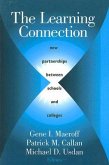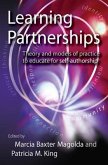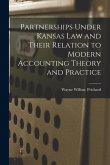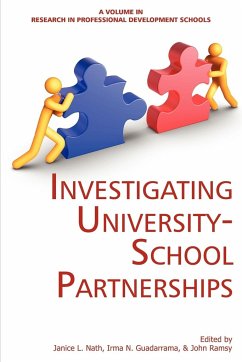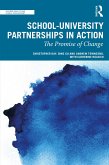Matthew T Hora, Susan B Millar
A Guide to Building Education Partnerships
Navigating Diverse Cultural Contexts to Turn Challenge into Promise
Matthew T Hora, Susan B Millar
A Guide to Building Education Partnerships
Navigating Diverse Cultural Contexts to Turn Challenge into Promise
- Broschiertes Buch
- Merkliste
- Auf die Merkliste
- Bewerten Bewerten
- Teilen
- Produkt teilen
- Produkterinnerung
- Produkterinnerung
Examines the critical questions that education partners must ask themselves if they hope to succeed, such as: Why engage in a partnership? How do you select the best organizational structure for a partnership? How can school and university leaders and teachers effectively develop and operate partnerships? How do you communicate the benefits of partnership to motivate teachers, faculty, and administrators? Based on their research data and the literature, the authors identify the principles that they consider critical to answering these questions.
Andere Kunden interessierten sich auch für
![The Learning Connection: New Partnerships Between Schools and Colleges The Learning Connection: New Partnerships Between Schools and Colleges]() The Learning Connection: New Partnerships Between Schools and Colleges26,99 €
The Learning Connection: New Partnerships Between Schools and Colleges26,99 €![Learning Partnerships Learning Partnerships]() Learning Partnerships36,99 €
Learning Partnerships36,99 €![Partnerships Under Kansas Law and Their Relation to Modern Accounting Theory and Practice Partnerships Under Kansas Law and Their Relation to Modern Accounting Theory and Practice]() Wayne Wilbur PrichardPartnerships Under Kansas Law and Their Relation to Modern Accounting Theory and Practice15,99 €
Wayne Wilbur PrichardPartnerships Under Kansas Law and Their Relation to Modern Accounting Theory and Practice15,99 €![Reframing Community Partnerships in Education Reframing Community Partnerships in Education]() Miguel A GuajardoReframing Community Partnerships in Education54,99 €
Miguel A GuajardoReframing Community Partnerships in Education54,99 €![School, Family, and Community Partnerships School, Family, and Community Partnerships]() Joyce L EpsteinSchool, Family, and Community Partnerships56,99 €
Joyce L EpsteinSchool, Family, and Community Partnerships56,99 €![Investigating University-School Partnerships Investigating University-School Partnerships]() Investigating University-School Partnerships79,99 €
Investigating University-School Partnerships79,99 €![School-University Partnerships in Action School-University Partnerships in Action]() Christopher DaySchool-University Partnerships in Action55,99 €
Christopher DaySchool-University Partnerships in Action55,99 €-
-
-
Examines the critical questions that education partners must ask themselves if they hope to succeed, such as: Why engage in a partnership? How do you select the best organizational structure for a partnership? How can school and university leaders and teachers effectively develop and operate partnerships? How do you communicate the benefits of partnership to motivate teachers, faculty, and administrators? Based on their research data and the literature, the authors identify the principles that they consider critical to answering these questions.
Produktdetails
- Produktdetails
- Verlag: Taylor & Francis Ltd (Sales)
- Seitenzahl: 230
- Erscheinungstermin: 24. Januar 2011
- Englisch
- Abmessung: 226mm x 152mm x 15mm
- Gewicht: 318g
- ISBN-13: 9781579224721
- ISBN-10: 1579224725
- Artikelnr.: 31075681
- Verlag: Taylor & Francis Ltd (Sales)
- Seitenzahl: 230
- Erscheinungstermin: 24. Januar 2011
- Englisch
- Abmessung: 226mm x 152mm x 15mm
- Gewicht: 318g
- ISBN-13: 9781579224721
- ISBN-10: 1579224725
- Artikelnr.: 31075681
Matthew T. Hora is an Associate Researcher at the Wisconsin Center for Educational Research, University of Wisconsin-Madison, where he is currently conducting research on the psychological, cultural and organizational factors influencing teaching in Institutions of Higher Education. Matthew received his Masters in Applied Anthropology from the University of Maryland, College Park after several years experience in organic agriculture and food systems research. He has spent the past seven years working in program evaluation, specializing in assessing the effects of pedagogical reforms in the science, technology, engineering, and mathematics (STEM) fields at the tertiary level. Susan B. Millar , an anthropologist by training, is director of the education research challenge area of the Morgridge Institute for Research, and a senior scientist in the UW-Madison Wisconsin Center of Education Research. In her work with the Morgridge Institute for Research, she leads a team that is developing online interactive computer games and other learning resources designed to help youth and adults learn core science and engineering concepts in the biomedical disciplines. Judith A. Ramaley is President of Winona State University. Prior to coming to Minnesota, Dr. Ramaley held a presidential professorship in biomedical sciences at the University of Maine and was a Fellow of the Margaret Chase Smith Center for Public Policy. She also completed a residency as a Visiting Senior Scientist at the National Academy of Sciences.From 2001 to 2004, Dr. Ramaley was Assistant Director, Education and Human Resources Directorate (EHR) at the National Science Foundation (NSF). Prior to joining NSF, Dr. Ramaley was president and professor of biology at the University of Vermont. Dr. Ramaley has a special interest in higher education reform and has played a significant role in designing regional alliances to promote educational cooperation. She has contributed to national discussions about the changing nature of work and the workforce. She plays a national role in the exploration of civic responsibility and the role of higher education in promoting good citizenship. She also has published extensively on educational reform; science, technology, engineering, and mathematics education; and the leadership of organizational change.
Introduction. The Challenge and Promise of Education Partnerships The
Nature of Education Partnerships Working in a Partnership. New Tasks and
Challenges Methodology. Understanding the Underlying Mechanisms of
Partnership The Five Principles of Partnership How To Use This Book Part
One. Getting Ready for Partnership 1 Shall We Dance? Convening a
Pre-Partnership Planning Group Convening a Pre-Partnership Planning Group A
Final Word on Pre-Partnership Planning 2 Sizing Up Organizational
Aspirations and Attributes Problems, Goals, and Objectives Motivations
Capacity and Resources Autonomy and Interdependence 3 Understanding
Cultural Dynamics Avoiding the Common-Culture Myth Focusing On Cultural
Dynamics Within Organizations Agenda Items for Your Pre-Partnership Meeting
4 Crossing Organizational and Cultural Boundaries Why Boundary Crossing is
Important Characteristics of Boundary Crossing Agenda Items for Your
Pre-Partnership Planning Meeting Part Two. Designing A Partnership 5 Types
of Organizational Structures for Partnership Three Main Partnership
Structures Selecting a Partnership Type 6 Administration and Leadership
Governance Selecting Leaders Other Administrative Functions 7 Effective
communication systems Working With Existing Systems Creating a Progressive
Partnership Communication System Part Three Implementing Partnerships 8
Designing the work Understand the Task Environment Select Leverage Points
Build Bridges to All Levels of the Local Partner Organization 9 Developing
and Managing Working Groups Guidelines for All Working Groups Additional
Guidelines for Collaborative Working Groups 10 The Key Roles of Trust and
Managing Conflict Dynamics of Trust in Partnerships Strategies for
Developing Trust Managing Conflict in Education Partnerships Epilogue
Appendix A. Methodology References Glossary Index
Nature of Education Partnerships Working in a Partnership. New Tasks and
Challenges Methodology. Understanding the Underlying Mechanisms of
Partnership The Five Principles of Partnership How To Use This Book Part
One. Getting Ready for Partnership 1 Shall We Dance? Convening a
Pre-Partnership Planning Group Convening a Pre-Partnership Planning Group A
Final Word on Pre-Partnership Planning 2 Sizing Up Organizational
Aspirations and Attributes Problems, Goals, and Objectives Motivations
Capacity and Resources Autonomy and Interdependence 3 Understanding
Cultural Dynamics Avoiding the Common-Culture Myth Focusing On Cultural
Dynamics Within Organizations Agenda Items for Your Pre-Partnership Meeting
4 Crossing Organizational and Cultural Boundaries Why Boundary Crossing is
Important Characteristics of Boundary Crossing Agenda Items for Your
Pre-Partnership Planning Meeting Part Two. Designing A Partnership 5 Types
of Organizational Structures for Partnership Three Main Partnership
Structures Selecting a Partnership Type 6 Administration and Leadership
Governance Selecting Leaders Other Administrative Functions 7 Effective
communication systems Working With Existing Systems Creating a Progressive
Partnership Communication System Part Three Implementing Partnerships 8
Designing the work Understand the Task Environment Select Leverage Points
Build Bridges to All Levels of the Local Partner Organization 9 Developing
and Managing Working Groups Guidelines for All Working Groups Additional
Guidelines for Collaborative Working Groups 10 The Key Roles of Trust and
Managing Conflict Dynamics of Trust in Partnerships Strategies for
Developing Trust Managing Conflict in Education Partnerships Epilogue
Appendix A. Methodology References Glossary Index
Introduction. The Challenge and Promise of Education Partnerships The
Nature of Education Partnerships Working in a Partnership. New Tasks and
Challenges Methodology. Understanding the Underlying Mechanisms of
Partnership The Five Principles of Partnership How To Use This Book Part
One. Getting Ready for Partnership 1 Shall We Dance? Convening a
Pre-Partnership Planning Group Convening a Pre-Partnership Planning Group A
Final Word on Pre-Partnership Planning 2 Sizing Up Organizational
Aspirations and Attributes Problems, Goals, and Objectives Motivations
Capacity and Resources Autonomy and Interdependence 3 Understanding
Cultural Dynamics Avoiding the Common-Culture Myth Focusing On Cultural
Dynamics Within Organizations Agenda Items for Your Pre-Partnership Meeting
4 Crossing Organizational and Cultural Boundaries Why Boundary Crossing is
Important Characteristics of Boundary Crossing Agenda Items for Your
Pre-Partnership Planning Meeting Part Two. Designing A Partnership 5 Types
of Organizational Structures for Partnership Three Main Partnership
Structures Selecting a Partnership Type 6 Administration and Leadership
Governance Selecting Leaders Other Administrative Functions 7 Effective
communication systems Working With Existing Systems Creating a Progressive
Partnership Communication System Part Three Implementing Partnerships 8
Designing the work Understand the Task Environment Select Leverage Points
Build Bridges to All Levels of the Local Partner Organization 9 Developing
and Managing Working Groups Guidelines for All Working Groups Additional
Guidelines for Collaborative Working Groups 10 The Key Roles of Trust and
Managing Conflict Dynamics of Trust in Partnerships Strategies for
Developing Trust Managing Conflict in Education Partnerships Epilogue
Appendix A. Methodology References Glossary Index
Nature of Education Partnerships Working in a Partnership. New Tasks and
Challenges Methodology. Understanding the Underlying Mechanisms of
Partnership The Five Principles of Partnership How To Use This Book Part
One. Getting Ready for Partnership 1 Shall We Dance? Convening a
Pre-Partnership Planning Group Convening a Pre-Partnership Planning Group A
Final Word on Pre-Partnership Planning 2 Sizing Up Organizational
Aspirations and Attributes Problems, Goals, and Objectives Motivations
Capacity and Resources Autonomy and Interdependence 3 Understanding
Cultural Dynamics Avoiding the Common-Culture Myth Focusing On Cultural
Dynamics Within Organizations Agenda Items for Your Pre-Partnership Meeting
4 Crossing Organizational and Cultural Boundaries Why Boundary Crossing is
Important Characteristics of Boundary Crossing Agenda Items for Your
Pre-Partnership Planning Meeting Part Two. Designing A Partnership 5 Types
of Organizational Structures for Partnership Three Main Partnership
Structures Selecting a Partnership Type 6 Administration and Leadership
Governance Selecting Leaders Other Administrative Functions 7 Effective
communication systems Working With Existing Systems Creating a Progressive
Partnership Communication System Part Three Implementing Partnerships 8
Designing the work Understand the Task Environment Select Leverage Points
Build Bridges to All Levels of the Local Partner Organization 9 Developing
and Managing Working Groups Guidelines for All Working Groups Additional
Guidelines for Collaborative Working Groups 10 The Key Roles of Trust and
Managing Conflict Dynamics of Trust in Partnerships Strategies for
Developing Trust Managing Conflict in Education Partnerships Epilogue
Appendix A. Methodology References Glossary Index

